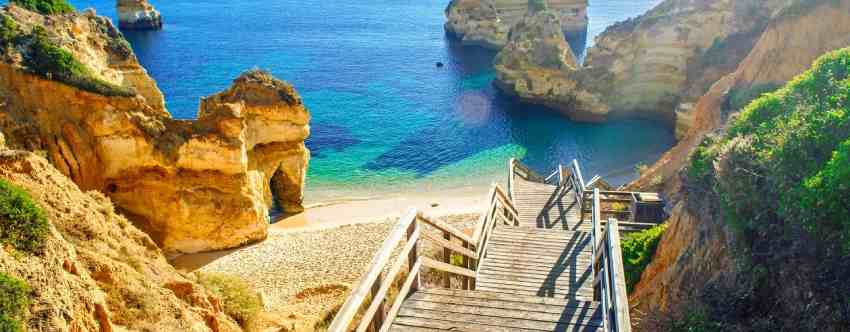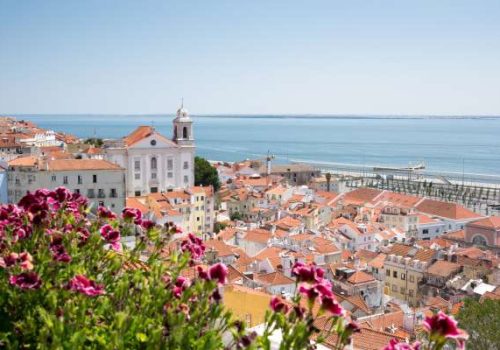Living and Working in Portugal
Information & guidance about seasonal jobs in Portugal
Portugal is primarily known for its welcoming population, stunning natural beauty, and delightful port wine. The country shares its borders solely with Spain. Additionally, you’ll find numerous national parks and the Azores (a group of 9 islands that belong to Portugal). These beautiful islands are located approximately 1400 kilometers away from the Portuguese mainland but have a lot to offer. You can explore botanical gardens, volcanoes, and various animals, including whales and dolphins.
Portugal boasts a coastline stretching for about 830 kilometers, featuring beautiful sandy beaches, seaside resorts, and plenty of water sports facilities. Besides sun, sea, and sand, you can also engage in various winter sports in the mountainous region of Serra da Estrela during the winter.
Most tourists primarily come to Portugal for its major cities, such as Lisbon, Porto, and the Algarve. The Algarve is renowned for its gorgeous beaches and impressive cliff formations, making it a popular vacation destination for tourists from around the world. Are you interested in learning everything about working and living in Portugal? Keep reading and get ready for a wonderful and sunny experience!
Permanent jobs in Portugal
- Customer support
- Portugal
- Customer support, Marketing
- Portugal
- Customer support
- Portugal
- Customer support
- Portugal
Seasonal jobs in Portugal
- Customer support
- Portugal
- Customer support, Marketing
- Portugal
- Customer support
- Portugal
Working in Portugal
Rules and working conditions in Portugal
In Portugal, it is illegal to work more than 40 hours per week and more than 8 hours per day. Most companies offer contracts for 35 to 40 hours spread over a 5-day workweek. Many Portuguese companies also operate on Saturdays, so you may be asked to work on weekends.
Salary in Portugal
The average monthly salary in Portugal falls between €900 and €1000. While this may seem low (especially compared to the Netherlands and Belgium), it’s a decent wage in Portugal. The cost of living in Portugal is relatively low, allowing you to lead a comfortable and enjoyable life with this salary.
Minimum Wage in Portugal
The minimum wage in Portugal, set for the year 2022, is €705 per month. This wage is paid 14 times a year, with holiday and Christmas bonuses added on top. Ultimately, the minimum wage in Portugal amounts to approximately €823 per month.
Taxation in Portugal
To start, the corporate tax rate in Portugal is only 21%, making it one of the lowest rates in Europe. This makes Portugal an attractive destination for foreign companies looking to establish themselves in Europe.
Portugal employs a progressive income tax system, meaning the more you earn, the higher your tax rate will be. There are a total of 4 tax brackets in Portugal, with rates ranging from 14% to 48%. The highest marginal tax rate of 48% applies to incomes above €80,000 per year.
Holidays in Portugal
Every employee is entitled to a minimum of 22 statutory vacation days per year, excluding the 13 national holidays in Portugal. Below is a list of all the holidays in Portugal:
- New Year’s Day (January 1)
- Epiphany (January 6)
- Carnival (February/March)
- Good Friday (April)
- Labor Day (May 1)
- Corpus Christi (June)
- Portuguese National Day (June 10)
- Assumption of Mary (August 15)
- All Saints’ Day (November 1)
- Independence Day (October 5)
- Immaculate Conception (December 8)
- Christmas Eve (December 24)
- Christmas Day (December 25)
- Boxing Day (December 26)
Work Culture in Portugal
In Portugal, you’ll experience a relaxed pace of life, which is also reflected in the workplace. People here tend to be generally laid-back, taking their time for everything. If you’re used to a fast-paced or hectic work environment, this might initially be a bit frustrating, but it’s something you’ll need to adapt to when working in Portugal.
Additionally, the Portuguese are highly relationship-oriented. It’s expected that you invest effort and time in building relationships with your colleagues.
Another thing to keep in mind is that punctuality in Portugal isn’t as critical as in many other countries. It’s not uncommon for meetings to start half an hour late or for colleagues to take long lunch breaks.
So, the Portuguese work culture is very relaxed and friendly. Try to get accustomed to it, get to know your colleagues well, and be patient if things move a bit slower than you might be used to.
Key Sectors in Portugal
Portugal boasts a strong agricultural sector. Thanks to its mild climate and fertile soil, a variety of crops are grown, including olives, grapes, and citrus fruits. Olive oil and wine are prime examples of important export products. Additionally, Portugal is a significant producer of wheat, corn, and rice.
The industrial sector also plays a vital role in the Portuguese economy. The country manufactures a wide range of products, including textiles, clothing, shoes, machinery, and electronics. Several major international companies operate in Portugal, such as Volkswagen Group’s subsidiary, AutoEuropa, which produces and exports cars to other European countries from Portugal.
Furthermore, the tourism and service sectors make substantial contributions to Portugal’s economy.
Working in Portugal – Lisbon
Lisbon is a bustling city offering job seekers from all over the world numerous opportunities. The city boasts a strong economy and is home to many multinational companies as well as startups.
Lisbon is an incredibly popular tourist destination, so it’s no surprise that you can find many jobs in the hospitality and tourism sectors in the city. From hotel staff and waiters to tour guides and bus drivers.
Digital nomads also love the city and are eager to live in Lisbon for a while. Lisbon serves as an excellent base for exploring the rest of Europe, thanks to its affordable flights to other destinations and reliable internet connections. The city has a relaxed atmosphere, numerous coworking spaces, and cafes where you can get your work done.
Working in Porto
Porto is one of the oldest cities in Europe, nestled along the Douro River in northern Portugal, famous for its port wine. The historic center of Porto is a UNESCO World Heritage site, and the city is home to many museums, churches, and bridges for you to admire. Visitors can also enjoy a boat trip on the river or partake in the city’s nightlife.
Popular jobs in Porto include roles in tourism, hospitality, and retail. Due to its historic monuments and world-renowned port wine, the city is a popular tourist destination, offering plenty of opportunities for those who enjoy working with people. Additionally, there are ample job opportunities in education and healthcare in Porto.
Working in Portugal – Algarve
The Algarve is a stunning region in the south of Portugal, known for its beautiful beaches, wonderful weather, and friendly people. Furthermore, the Algarve is a popular vacation destination.
As a result, tourism is the largest industry in the region, offering numerous job opportunities in hospitality and the tourism sector. Especially during the high season, you can quickly find a new and enjoyable (part-time) job here.
Construction, agriculture, and fishing are other popular sectors in the Algarve.

Working in Portugal – Call Center
You can find numerous call center/customer service job openings in Portugal, primarily in Lisbon and Porto, the country’s two largest cities. Both cities host many international companies, multinationals, and Business Process Outsourcing (BPO) firms that regularly seek new colleagues who are multilingual, willing to live in Lisbon, and proficient in specific languages, including Dutch/Flemish, German, and English.
They are looking for individuals who can fill various roles, such as customer service representatives and content moderators. Feel free to check out Anywork Anywhere for the latest Portugal job listings.
Working in Portugal – Hospitality & Tourism
As you’ve read, Portugal is a popular tourist destination. If you’d like to work in the tourism sector and/or hospitality industry while enjoying the beautiful weather and getting to know Portuguese culture, Portugal is the perfect destination! From hotels and restaurants to bars, tour operators, and travel agencies, numerous businesses in Portugal cater to tourists.
If you intend to work in the tourism sector and/or hospitality industry in Portugal, it’s valuable to have a strong command of the Portuguese language. While English is widely spoken, knowing some Portuguese will give you an edge over the competition.
Keep an eye on our job vacancy page, especially if you’re interested in working in Portugal. We regularly update this page with new job opportunities.
Living in Portugal
Benefits of Living and Working in Portugal
Living and working in Portugal is a fantastic experience. Besides the wonderful weather, there are many more reasons to consider residing and working in Portugal. The country ranks high in terms of housing, work-life balance, and personal safety, and for good reason.
Employment opportunities in Portugal are on the rise, partly because many international companies are expanding or choosing to open new offices in Portugal. This is excellent news for those contemplating working in Portugal. Lisbon, the capital of Portugal, offers the most job prospects. Additionally, Porto, the second-largest city, is also a popular choice for expats.
Due to Portugal’s warm climate, people spend a lot of time outdoors and engage in various activities together. From enjoying a leisurely lunch, taking a pleasant walk, and going for a run to spending an evening in a café: it’s quite easy in Portugal to find people to explore with. Making friends with the locals is also not at all difficult and is a great way to become proficient in the Portuguese language and experience Mediterranean cuisine. Enjoy a delightful, typical Portuguese dish on a charming terrace or spend a day windsurfing with your new friends. They can surely share more insights about living and working in Portugal.
Accommodation in Portugal
Considering living and working in Portugal for a few months or years? Then you’ll be pleased to hear that, in general, it’s not difficult to find affordable accommodation in Portugal. Since Lisbon and Porto are extremely popular among both tourists and expats, it can be a challenge to quickly find suitable housing in these cities. However, with our assistance, you’ll find a lovely and affordable place in no time.
Of course, you can also search for a suitable apartment on-site. In the meantime, you can stay in a hostel, which will cost you roughly between €10 to €40 per night. In a budget 2-star hotel, you’ll pay an average of €35 for a double room. Through Airbnb, you can get a room for €15 per night, while a house will cost around €40 per night. If you want to save money, you can also choose to stay in a pensão (family inn). By connecting with expats and the local population, you can often find a home that’s available for a very low price and for an extended period. So, don’t hesitate to ask for help because the local population is very friendly and welcoming. They will find it fun and interesting that you’ve chosen to live and work in Portugal.
Some websites where you can easily find accommodation in Portugal are:
Furthermore, there are many Facebook groups (such as Lisbon apartments for rent and Accommodation for digital nomads in Lisbon) where you can easily find a new home or new housemates.
Transportation in Portugal
Transportation in Portugal is very well developed, with many options to fit every budget. In larger cities like Porto and Lisbon, you can take the train, tram, or bus for as little as €1.50. In smaller Portuguese towns and villages, buses are commonly used, and the fares are roughly the same.
Since many local residents enjoy cycling, you can find bike rental companies everywhere. If you want to visit islands like the Azores and Madeira for a day, it’s best to rent a car. Depending on the type of car you want to rent, you can expect to pay around €45 to €75 per day.
Furthermore, traveling by train in Portugal is very easy and affordable. You’ll pay about €25 to €40 for a trip from Porto to Lisbon. For a train journey from the far north of Portugal to the far south, you’ll spend approximately €40 to €50. This price includes both regular and high-speed trains!
Of all transportation options, the bus is the most affordable. If you want to explore the country and take a bus trip from Lisbon to Lagos, a bus ticket costs around €30 – €40. A day trip of 8 hours from the far north to the far south starts at a ticket price of €30. If you’re living and working in Portugal and want to take a short vacation in Spain, you can take a bus or train.
One of the great things about working in Portugal is that you can easily spend a weekend on one of the islands. For just €30, you can fly from Lisbon to the Azores, and for about €5 more, you can fly to Madeira. The incredible feeling that such a flight to the islands offers is priceless.
From the mainland, you can also take a ferry to visit the Portuguese islands. For less than €60, you can take a day cruise to Porto Santo, one of the beautiful islands of Madeira, and for approximately €20, you can sail to the Azores with Atlânticoline.
Portugal has four international airports in Lisbon, Porto, Faro, and Beja. If you’re considering living and working in Portugal, it’s reassuring to know that you can easily take a flight home if you ever feel homesick.
Food in Portugal
Portuguese cuisine is quite traditional, with the main dish usually featuring fish, particularly sardines and tuna. Additionally, stews with pork, goat, and lamb, prepared in Portuguese wine, are common in Portugal. The use of the ‘cataplana,’ a type of closed wok-like pan in which dishes are steamed in their own juices, is unique to this region. Another well-known Portuguese dish is Chicken piri piri, which is roasted chicken with peppers, originating from the former African colonies.
In a Portuguese bakery, you’ll pay about €2 for a snack, and for lunch, you’ll spend approximately €5. For a full meal with a glass of authentic Portuguese wine, the average cost is €15. If you’re planning to live and work in Portugal soon, we highly recommend exploring the cozy local restaurants and cafes to enjoy a delicious and affordable meal. If you prefer to cook for yourself, €30 should suffice for a week’s worth of groceries, including pasta, chicken, vegetables, spices, and some staple items.
Nightlife in Portugal
The nightlife in Portugal is vibrant, offering a variety of options such as nightclubs, theaters, casinos, cafes, bars, and discotheques. You’ll never be bored, especially in the major cities of Portugal and the Algarve.
In Porto, most bars and cafes are in the old city center of Ribeira. Nightclubs are located just outside the city. In Porto’s newest nightlife district, Jardim do Palácio de Cristal, you’ll find many trendy bars.
Lisbon’s nightlife is among the best in Europe, so if you’re a party enthusiast, Lisbon is the place to be! There are numerous hip discotheques, bars, and cafes.
In the coastal towns of the Algarve, you’ll also find plenty of nightlife options. The party starts when the sun sets and continues into the early hours. There are restaurants, bars, discotheques, clubs, casinos, and places with live music that stay open late. If you’re looking for a vibrant nightlife experience in Portugal, you’re in the right place, especially in places like Albufeira, a well-known destination for young people seeking Portugal’s lively nightlife.
Moreover, Portugal is a great country for music enthusiasts. The MTV Europe Music Awards were held in Portugal in 2015, and the country won the Eurovision Song Contest in 2017. On the streets and in cafes, you can enjoy music genres such as pop, folk, classical, trance, rock, and hip-hop from the United Kingdom, North America, the Caribbean, and Brazil.
Portugal’s music festivals are also among the largest and most popular events in Europe. Think of the international Goa trance festival, the Boom Festival that won the European Festival Award for Portugal, and the NOS Alive Festival featuring indie, rock, and alternative bands, as well as performances by Bob Dylan, Radiohead, and Arctic Monkeys. In short, true music lovers among us will find living and working in Portugal amazing!

Portugal’s Culture
Portugal is known for its vibrant folkloric traditions. These include the popular dance style called the fandango, as well as traditional Portuguese clothing. In terms of music, Portugal has a rich tradition of folk music. Fado is a particularly popular genre and is often described as the “soul of Portugal.” Portuguese folk music is usually emotional and melancholic.
One of the most distinctive aspects of Portuguese culture is the language. Portuguese is a Romance language spoken worldwide by approximately 260 million people. It is the official language of Portugal, Brazil, and several other countries.
The People of Portugal
The population of Portugal is known for its hospitality and warmth. Portuguese culture is based on a strong sense of community and family. People here place a high value on relationships and often go out of their way to help others. This can be seen in how strangers are often treated like family.
Portugal is a culturally rich country with a diverse history. Locals are very proud of their culture and traditions.
Cost of Living in Portugal
Overall, the cost of living in Portugal is lower than in the Netherlands. Consumer prices in Lisbon, for example, are about 38% cheaper than in Amsterdam. Additionally, rental prices in Lisbon are even 39% cheaper than in Amsterdam.
To give you an even better idea of the cost differences between cities, we have made a comparison. In Lisbon, you would need about €3,329 to maintain the same standard of living that you can have in Amsterdam with €5,400.
Portugal’s Landscape and Nature
The nature in Portugal is surprising and highly diverse. From mountains, plains, hills, and rivers to lakes, lagoons, and waterfalls. Many regions in Portugal feature characteristic plantations and fields of olive trees, cork oaks, walnut trees, pine trees, grapes, fruit trees, sunflowers, and wildflowers. Within the Portuguese countryside, you’ll come across rock formations, stunning nature parks, ruins, mountain villages, clay deposits, flocks of sheep, birds, and other wildlife. The nature in Portugal is also definitely a reason why people are eager to live and work in Portugal.
Portugal’s Climate
Portugal has a temperate climate with mild winters and dry, warm summers. The average temperature in the country varies from 18 to 25 degrees Celsius. In the summer, temperatures in some parts of the country can even reach 40 degrees Celsius. Portugal experiences a good amount of rainfall, especially in the northern part of the country. The heaviest rainfall occurs in the months of October and November.
The best time to visit Portugal is in the spring or autumn, when the weather is milder. If you want to escape cold weather, winter is also a good time to visit Portugal because average temperatures are still relatively warm compared to other European countries.
Must-See Places in Portugal
Lisbon
The capital of Portugal is situated on the Tagus River. This charming city boasts numerous attractions, including many museums such as the Museu Nacional de Arte Antiga (National Museum of Ancient Art), the National Tile Museum, and the Museu Nacional do Azulejo (National Tile Museum). You can also admire historic buildings, churches, monasteries, and palaces. The Mosteiro dos Jerónimos monastery in the Belém district is one of the city’s most significant landmarks. The Baixa district is known for its Rossio Square, while the vibrant Bairro Alto district is loved for its restaurants and nightlife. This district is about 30 meters higher than the rest of the city and can be reached from the center using an elevator called the “Elevador de Santa Justa.” An interesting fact is that this elevator was designed by Gustave Eiffel.
Porto
The port city of Porto is globally renowned for its production of delicious port wines. These wines leave the country through the adjacent district of Vila Nova de Gaia to be distributed worldwide. If you plan to live and work in Portugal, we strongly recommend enjoying a delightful glass of port wine. But besides these port wines, Porto has much more to offer. For example, pay a visit to the famous and historic bookstore called Livraria Lello & Irmão in the center of Porto. Once you step inside, you’ll be amazed! The Sé Cathedral and the remarkable concert hall Casa de Música are also must-see during your exploration of Porto. And when you arrive in the old Ribeira district, the colorful facades will transport you back in time… In any case, this popular city is definitely worth a visit if you plan to live and work in Portugal.
Albufeira
The coastal town of Albufeira is popular among the many tourists who visit Portugal each year. The well-known entertainment area called “The Strip” attracts many visitors. The beaches at Praia dos Pescadores, Praia do Tunel, and Fisherman’s Beach provide wonderful entertainment by the water. Near Albufeira, you’ll find the Paderne Castle with its remaining city walls.
Praia da Marinha
Portugal’s most beautiful beach, Praia da Marinha, is located in the Algarve near Lagoa. You often see this unique piece of beach in brochures and other promotional materials. Surrounded by rock formations and cliffs lies a beach with clear water. It’s quite a climb down via dozens of steps, but you’ll end up in a truly remarkable location.
The Portuguese Islands Madeira
The Portuguese island of Madeira is located in the Mediterranean Sea, about 1000 kilometers off the coast of Portugal. The island is especially popular among hikers and nature enthusiasts. This “flower island” has few beaches, making it not very touristy. The island’s capital is Funchal, and here you can find several attractions. These include botanical and tropical gardens, a cable car, a cathedral, and a palace. You could also walk towards Rabacal to see 25 springs cascade down like waterfalls. Furthermore, in the north of Madeira, you’ll find traditional villages and cultural heritage.
Azores
The Azores consist of 9 islands and, like Madeira, they belong to Portugal. The largest city is on the island of São Miguel, which is called Ponta Delgada. Here, you’ll find a pleasant promenade, the Parque Atlantico shopping center, the São Sebastiao church, a fort, and a harbor, among other attractions. On the same island, you’ll find the town of Furnas with many hot springs. The highest mountain in the Azores and even in Portugal is Pico Alto, which stands at 2351 meters. Pico Alto means the highest mountain. Each island has its own character, making island hopping a unique and enjoyable way to get to know the Azores. It’s the perfect way to explore the Azores if you plan to live and work there.
Healthcare in Portugal
The quality of healthcare in Portugal is good and has significantly improved in recent years. The Portuguese healthcare system is even considered one of the best in Europe! This applies to both the public and private sectors. It’s also reassuring to know that Portugal has made efforts in recent years to accommodate English-speaking foreigners living and working in the country. Nowadays, many English-speaking doctors and professionals work in Portuguese healthcare institutions. This has made it much easier for expats who don’t speak Portuguese yet to communicate with their doctors.
The average healthcare costs in Portugal are lower than in many other European countries.
Living and working in Portugal: Frequently Asked Questions
What do you need to work in Portugal?
Firstly, you need a valid passport or identity card. Ensure beforehand that your passport or identity card is still valid. If, as a foreigner, you need to apply for a new identification document in Portugal, it may cost you more time and money than doing so in your home country.
If you plan to work in Portugal for more than 3 months, you must register with the municipality of your new place of residence in Portugal. For this, you’ll need a deregistration certificate, a valid identification document, and an employment contract.
Moreover, it’s handy to open a Portuguese bank account when working in Portugal. This can be easily arranged, and you have several banks to choose from, including Banco BPI and Millennium BCP. To open a bank account, you’ll need the following documents:
- A valid identification document.
- Your Portuguese tax number (NIF).
- Your lease contract/address proof.
- Your employment contract or other proof of income.
Additionally, it’s advisable to get a private health insurance policy in Portugal. While not mandatory if you pay taxes in Portugal, we recommend it since private health insurance can provide faster access to certain treatments and also allows you to use private hospitals.
How do I become a resident in Portugal?
If you plan to work and live in Portugal for more than three months, don’t forget to deregister with your municipality in the Netherlands or Belgium before departure. Bring the deregistration certificate to Portugal and register with the municipality of your new place of residence. If you can also present a valid identification document and proof of income, you’ll receive a registration certificate from the municipality.
Note: This certificate is valid for 5 years. Therefore, make an appointment with the SEF (Foreigners and Borders Service) in time to apply for a permanent residence card (Cartão de Residencia). This card is valid for 10 years and needs to be renewed afterward.
What is an average monthly salary in Portugal?
It’s worth noting that the average monthly salary in Portugal (€985) is considerably lower than in the Netherlands, Germany or Belgium. However, because the cost of living in Portugal is also lower, you can lead a decent life with this income in Portugal.
Can I easily move to Portugal?
YES! If you are an EU citizen, and as such, you don’t need a work permit or visa to live and work in Portugal. UK citizens will have to apply for Temporary Stay Visa when they stay for more than 90 days.








